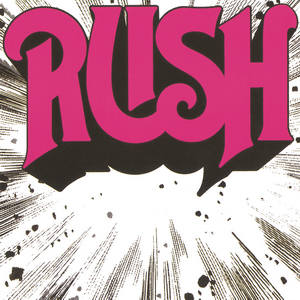The Workmen Have Arrived
I have probably never seen a more fitting album cover than the debut studio album of Rush. A
white, empty background that is then heavily contrasted with the gigantic, bold purple of the

 The charm of Rush’s self-titled is that it is a non-complicated, fun hard rock album; it’s no frills, no nonsense, just simple power and passion. Alex Lifeson’s guitars shear through the listener like a finely sharpened spear, Geddy Lee’s voice soars to the high heavens, with his bass performance giving a nice thick bottom end, and John Rutsey’s percussions are equivalent to mortar fire, this album in terms of performance is one of the most impressive to come from Rush’s expansive discography. The band is confident, they are focused, and they are proud of what they are able to showcase. However, the biggest drawback to the debut is that compared to the rest of the band’s catalog, the self-titled has aged fairly poorly; if you have been paying attention, you would have noticed I mentioned that the drummer is John Rutsey, not Neil Peart. Peart wouldn’t join Rush until the second album “Fly By Night” and along with his drumwork, he also would become the main contributor to the band’s writing, but without his lyrical talents which I will explore later in this retrospective, the writing duties fell onto Geddy and Alex, and it shows. Geddy and Alex’s approach to writing lyrics are incredibly basic, focusing on topics such as finding friends, going on the path to becoming a rock star, songs that don’t have anywhere near the lyrical sophistication or exploration of even the album that would come right after this one. This album almost comes from a different band, and while the name of the album is “Rush”, one wouldn’t be blamed for being surprised that this was the same band that only seven years later would release a record like “Moving Pictures”.
The charm of Rush’s self-titled is that it is a non-complicated, fun hard rock album; it’s no frills, no nonsense, just simple power and passion. Alex Lifeson’s guitars shear through the listener like a finely sharpened spear, Geddy Lee’s voice soars to the high heavens, with his bass performance giving a nice thick bottom end, and John Rutsey’s percussions are equivalent to mortar fire, this album in terms of performance is one of the most impressive to come from Rush’s expansive discography. The band is confident, they are focused, and they are proud of what they are able to showcase. However, the biggest drawback to the debut is that compared to the rest of the band’s catalog, the self-titled has aged fairly poorly; if you have been paying attention, you would have noticed I mentioned that the drummer is John Rutsey, not Neil Peart. Peart wouldn’t join Rush until the second album “Fly By Night” and along with his drumwork, he also would become the main contributor to the band’s writing, but without his lyrical talents which I will explore later in this retrospective, the writing duties fell onto Geddy and Alex, and it shows. Geddy and Alex’s approach to writing lyrics are incredibly basic, focusing on topics such as finding friends, going on the path to becoming a rock star, songs that don’t have anywhere near the lyrical sophistication or exploration of even the album that would come right after this one. This album almost comes from a different band, and while the name of the album is “Rush”, one wouldn’t be blamed for being surprised that this was the same band that only seven years later would release a record like “Moving Pictures”. These simplistic lyrics may be turn-off for fans of Rush’s more conceptual, lyrically rich material, and in the overall I would not recommend this album for potential newcomers as it’s not representative of the whole discography; with that mind, judging the album without the context of what was to come, the execution of the tracks are very solid. “Finding My Way” is a fantastic, blistering opening track, with a wild opening riff and Geddy screaming his lungs out, it grabs the listener’s attention immediately. Other highlights include “In The Mood” and “What You’re Doing” which exhibit early signs of Rush’s pension for catchy hooks, with some tasty blues-like riffs on the later track. “Here Again”, the longest track off the record, is a very nice ballad, a departure from the rest of the first side of the album but it luckily flows naturally in the track sequence, and “Before and After” has a very beautiful first two minutes until the lyrics kick in and the band demonstrates some intriguing dynamics, even at this early stage of their career. While those tracks have their merits and positives, they almost pale in comparison to the final track, “Working Man”.
These simplistic lyrics may be turn-off for fans of Rush’s more conceptual, lyrically rich material, and in the overall I would not recommend this album for potential newcomers as it’s not representative of the whole discography; with that mind, judging the album without the context of what was to come, the execution of the tracks are very solid. “Finding My Way” is a fantastic, blistering opening track, with a wild opening riff and Geddy screaming his lungs out, it grabs the listener’s attention immediately. Other highlights include “In The Mood” and “What You’re Doing” which exhibit early signs of Rush’s pension for catchy hooks, with some tasty blues-like riffs on the later track. “Here Again”, the longest track off the record, is a very nice ballad, a departure from the rest of the first side of the album but it luckily flows naturally in the track sequence, and “Before and After” has a very beautiful first two minutes until the lyrics kick in and the band demonstrates some intriguing dynamics, even at this early stage of their career. While those tracks have their merits and positives, they almost pale in comparison to the final track, “Working Man”.
This track is already fantastic on its own; a great meaty riff opens the song, and with its slow, almost lethargic pace, it brilliant exhibits the feeling of being at a 9-5 job and feeling as if your life is going nowhere. Two minutes into the song, the bass changes gears and Lifeson performs one of his earliest noteworthy solos and it becomes this roller coaster ride that isn’t stopping at any determined point. Compared to the rest of the tracks which dealt with relatively banal subject matters, this one stands out for how relatable the message it conveys, a trait that would follow the band throughout the rest of their career. The state of Ohio would respond positively to this track, when it was played on a Cleveland rock radio station, helping the band get some very much needed attention in the states, which would help grow their career. It’s safe to say that “Working Man” helped give Rush the attention that would allow them to create the records that they would make in the years to come.

While the band was getting a taste for success, with the music buying public requesting an album that they thought came from Led Zeppelin (I don’t know if that’s insulting or humorous), aspects were looking bright for the trio. Unfortunately though, due to health complications, founding drummer John Rutsey would harmoniously leave the band, with Geddy and Alex on the hunt for a new drummer who could help them capitalize on their success. Oh child, the drummer that they would recruit.

Comments
Post a Comment